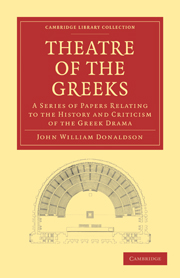Book contents
- Frontmatter
- PREFACE
- ERRATA
- Contents
- PART I THE HISTORY AND EXHIBITION OF THE GREEK DRAMA
- CHAPTER I On the origin of Dramatic Exhibitions in general
- CHAPTER II On the Origin of the Greek Drama
- CHAPTER III Union of the two Elements. Thespi
- CHAPTER IV On the proper Classification of Greek Plays. Origin of Comedy
- CHAPTER V On the Greek Tragedians
- CHAPTER VI On the Greek Comedians
- CHAPTER VII On the Representation of Greek Plays
- PART II ARISTOTLE
- PART III EXCERPTA CRITICA
- INDEX
CHAPTER V - On the Greek Tragedians
Published online by Cambridge University Press: 06 December 2010
- Frontmatter
- PREFACE
- ERRATA
- Contents
- PART I THE HISTORY AND EXHIBITION OF THE GREEK DRAMA
- CHAPTER I On the origin of Dramatic Exhibitions in general
- CHAPTER II On the Origin of the Greek Drama
- CHAPTER III Union of the two Elements. Thespi
- CHAPTER IV On the proper Classification of Greek Plays. Origin of Comedy
- CHAPTER V On the Greek Tragedians
- CHAPTER VI On the Greek Comedians
- CHAPTER VII On the Representation of Greek Plays
- PART II ARISTOTLE
- PART III EXCERPTA CRITICA
- INDEX
Summary
SECTION I.
CHŒRILUS, PHRYNICHUS, AND PRATINAS.
Use begets Use.
Guesses at Truth.As soon as Tragedy had once established itself in Greece, it made very rapid advances to perfection. According to the received dates, the first exhibition of Thespis preceded by ten years only the birth of Æschylus, who in his younger days contended with the three immediate successors of the Icarian. Chœrilus began to represent plays in the 64th 01. 523 B.C. and in 499 B.C. contended for the prize with Pratinas and Æschylus. It is stated that he contended with Sophocles also, but the difference in their ages renders this exceedingly improbable, and the mistake may easily have arisen from the way in which Suidas mentions the book on the chorus which Sophocles wrote against him and Thespis. It would seem that Tragedy had not altogether departed from its original form in his time, and that the chorus was still satyric, or tragic in the proper sense of the word. He is said to have written 150 pieces, but no fragments have come down to us. The disparaging remarks of Hermeas and Proclus do not refer to him, but to his Samian namesake, and he is mentioned by Alexis in such goodly company, that we cannot believe that his poetry was altogether contemptible. One of his plays was called the Alopë, and it appears to have been of a strictly mythical character. Some improvements in theatrical costume are ascribed to him by Suidas and Eudocia.
- Type
- Chapter
- Information
- Theatre of the GreeksA Series of Papers Relating to the History and Criticism of the Greek Drama, pp. 58 - 95Publisher: Cambridge University PressPrint publication year: 2010First published in: 1836



